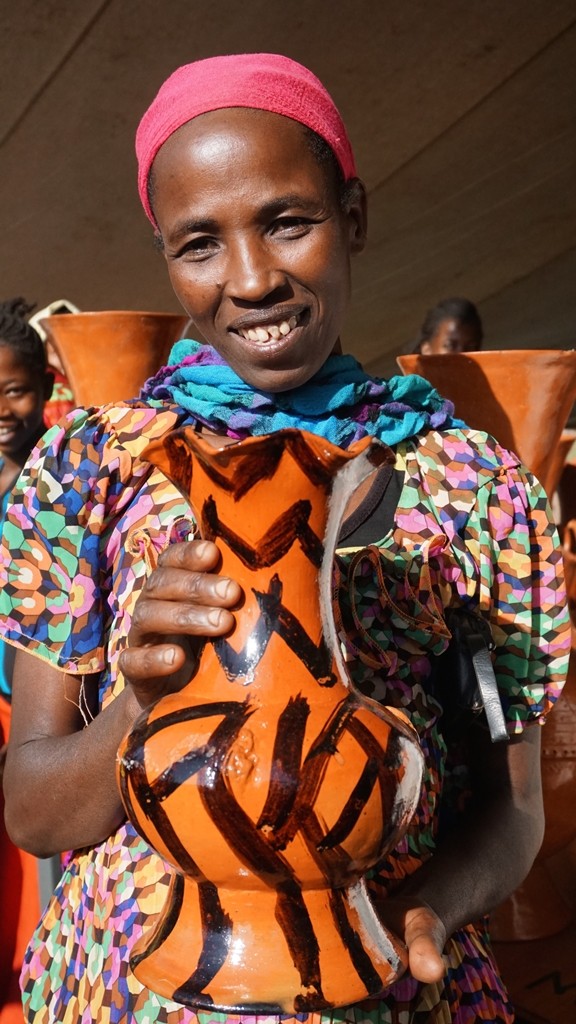
The sounds of celebration! That was the sound heard across the rural township of Durame on October 17, 2015, as thousands of people from Kembatta zone, located in the Southern Nations, Nationalities and Peoples' region of Ethiopia came together to celebrate the Beginning of the End of Marginalization.
The event was organized by a local non-governmental organization - Kembatti Mentti Gezzima (KMG)-Tope (Kembatta Women Standing Together) - which has organized annual community celebrations over the past 10 years, focused primarily on celebrating Uncut Girls - those who have not been circumcised. This year, however, attention shifted to publicizing the changes and transformation experienced by the "Golden Hands," the term KMG coined in reference to members of the artisan (potters) communities' that have been historically marginalized as outcasts in the Kembatta region.
Several honored guests were in attendance for the two-day celebration, including U.S. Ambassador to Ethiopia Patricia Haslach. The first day included a presentation of KMG's project achievements; in particular, the result of USAID's three years of support, which ended in September 2015. KMG's work employs a three-prong approach: ecological, economic, and social, providing women and men with opportunities to become educated, stay healthy, and be financially independent. They also encourage and strengthen communities to help them realize that they have the capacity, as well as social and cultural assets to effect positive change. With USAID support over the last three years, KMG continued working with and started celebrating the marginalized potters' communities within Kembatta zone. Of emphasis was the communities' entitlement to basic human dignity. Historically, this community of people -- estimated between 2,500 to 4,000 people in each woreda (district) of Kembatta zone -- have been discriminated against, marginalized, denied and/or lacked access to education, and considered unclean and untouchable. As such, they did not intermingle with the society-at-large, and had limited social and economic opportunities aside from selling pottery within their communities for a meager income.
Today, things are slowly beginning to change. With USAID assistance, KMG focused on four woredas, offering members of these communities with opportunities to learn to read and do basic mathematics, as well as gain life skills in improved health and sanitation. USAID also supported activities for self-help women's groups, saving and loan associations, asset-based capacity enhancement (provision of animals to enhance economic opportunities and status) and increased the participation of girls from marginalized communities in school. Over 50,000 people, both men and women, benefitted from this effort. Perhaps more importantly, KMG has also worked with woreda officials and service providers to improve their engagement with all citizens, including the Golden Hands, to improve the delivery of basic services to this community of people. A lot of the success of this work occurred through the use of Community Conversations-where community members gather periodically to discuss matters of common interest. A total of 250 volunteers working across 125 community groups were trained to lead these discussion forums.
Bogaletch "Boge" Gebre and her sister Fikrte Gebre founded KMG in 1999 with the goal of helping to create an environment where the values and rights of women are recognized and where their talents and wisdom are nurtured. Over its past 16 years of existence, KMG has been able to raise communities' awareness on issues related to gender-based violence, such as FGM, as well as the plight and transformation of marginalized artisan communities, to the point where marriages are now taking place between artisan and non-artisan community members.
KMG is poised to build on these successes, as it strives to build its managerial and operational capacity under USAID's Local Capacity Development program. As Ambassador Haslach stated in her speech at the event and as the celebration banners reflected, this is just the beginning; "Empowering artisans and other marginalized groups is in everyone's interest. Empowerment builds freedom, human dignity, and self-worth for individuals and groups, while also strengthening the entire community by building cohesion and mutual respect."
See also
USAID Ethiopia Democracy and Governance
Additional photos [Flick







Comment
Make a general inquiry or suggest an improvement.